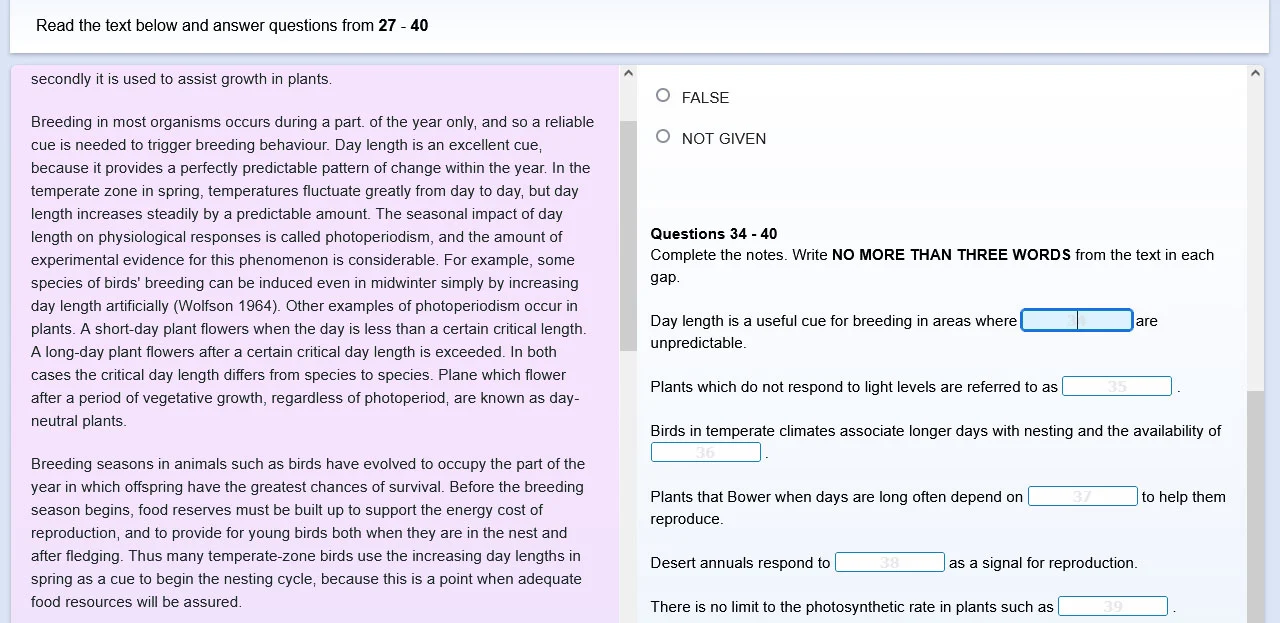
IELTS Reading Tips | Note Completion Question
How to master the Note Completion Question
How to master the Note Completion Question
- Note completion involves filling gaps in a set of incomplete notes. In IELTS Reading, the notes will be sentences that will contain gaps. These sentences will summarise ideas from the text, and you will need to find words from the text that fill the gaps in the notes.
- Like other completion tasks, a common concern for test-takers is ensuring that they understand the gist (general meaning) of the text to be able to locate the answers, which requires strong skimming and scanning skills.

Useful Tips:
- It is crucial that you read the instructions very carefully. The instructions will indicate the word limit available to you to answer the question. Instructions may say 'USE NO MORE THAN 2 WORDS'. This means that the only acceptable answers will either be 1 word from the passage or 2 words from the passage, but no more than that.
- Make sure you only use words taken directly from the passage. You may not use your own words to fill in a gap, as such answer will not be accepted.
- IELTS Reading Note Completion is about understanding the meaning of the text. Look for the title which will contain key language and information you can paraphrase (express in different words), so that you get an idea of what the text is going to be about.
- The notes will be incomplete sentences with gaps that paraphrase an idea in the text, which means that they will say what the text says in other words. Therefore, when looking for the answers in the text, do not look for the exact same words as in the notes. Most of the words will be different in the text. You must paraphrase the words in the notes, and look for those new words in the text.
- There will be some language that can be paraphrased like verbs and nouns and their synonyms (e.g. = 'focus' also means 'concentrate', 'admiration' also means 'awe'). Other language, like names and dates will not be paraphrased, but may easier to spot in the text.
- Answers do not necessarily come in order, so effective skimming of the text is essential. Read the passage quickly but make certain to understand what you read. Rushing without understanding will delay the process as you will need to go over the text more than once, and could also cause you to misinterpret the content.
- While skimming is a key technique, scanning is also necessary when looking for answers in the passage. Once you have skimmed the text and paraphrased the notes, it is time to look for the new words in the text using scanning skills. Look for that new language and read carefully around it when you find it, to decide on your final choice of words for your answer.
- The grammar used in the notes will be a great indicator of the type of language to look for as your answers. When studying a note, ask yourself: will the words that fill the gap need to be a noun? A verb? An adjective? Once you have determined the type of language, you can locate your synonyms/paraphrased language and choose the appropriate words by reading around them.
- Make the best use of your time, and only allow up to 2 minutes for text skimming. To get an idea of what the text is about, it often helps to read the first and last paragraphs of the passage, as well as the topic sentences (first sentence of each paragraph).
- Instructions that inform you of your word limit can be confusing. Here is a detailed explanation on how to interpret them; for example:
- Write NO MORE THAN THREE WORDS AND/OR A NUMBER
-
This means that you can use:
(1 word OR 2 words OR 3 words OR 1 number) OR (1 word + 1 number) OR (2 words + 1 number) OR (3 words + 1 number) - Numbers expressed in letter form with more than one word ('twenty-two' instead of '22') count as one word. In this case: 'fifty-four people' should count as 3 words, but 'fifty-four' count as 1 word, so 'fifty-four people' will be considered 1 number + 1 word.
- Words with hyphens (-) such 'high-spirited' or 'low-key' count as one word.
- Although answers do not always come in order, they tend to be found in a specific part of the passage rather than scattered throughout the passage.
Pay attention to the helpful notes below:
- Now is the time to practise this type of question:
-
Temperature for garden strawberriesIdeally, you want the temperature of your garden strawberries to be between 60 degrees and 80 degrees Fahrenheit. As long as you protect the plant from frost, it can endure a temperature as low as 22 degrees Fahrenheit. Make sure to avoid humidity by providing plenty of air circulation for the plants.Write ONE WORD ONLY from the passage in each gap.It is possible for a strawberry plant to survive through lower temperatures so long as it is shielded from .
- Paraphrasing:
- It is possible for a strawberry plant to survive through colder temperatures so long as it is shielded from ................... .
-
survive = get through, endure
colder temperatures = colder weather / lower temperatures
shielded = protected, safe from - Explanation:
- Below is the part of the text where the answer is found:
-
'As long as you protect the plant from frost, it can endure a temperature as low as 22 degrees Fahrenheit.'
-
protect = keep safe from, shield
frost = correct answer
endure = survive
temperature as low as = temperature as cold as
1 comment

Nima BabazadehApr 07, 2024
Frost = correct answer
You must login to post comments!